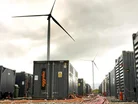Why Battery Power is Crucial for Manufacturing Green Future

The UK Government’s new green paper, Invest 2035: The UK’s Modern Industrial Strategy, invites industry consultation on shaping the nation’s manufacturing future.
The document outlines advanced manufacturing as a priority for the next decade, spotlighting the industry's need for clean energy and reduced dependence on fossil fuels across industry.
Aggreko, a leader in energy solutions, argues that Battery Energy Storage Systems (BESS) are the cornerstone technology that could enable manufacturers to balance sustainability with growth.
With national grid infrastructure struggling to keep pace with demand, battery systems offer an alternative, allowing manufacturers to rely on more consistent energy, potentially bridging the gap as they wait for grid improvements.
Aggreko sees this as a key strategy to help manufacturers shift to sustainable energy sources without risking productivity.
Aggreko offers energy storage solutions that help businesses streamline their power systems and reduce operational costs, which is particularly valuable in the manufacturing sector.
Aggreko’s Battery Energy Storage Systems (BESS) are designed to support manufacturers with scalable, efficient energy management tailored to different production demands.
These storage systems allow businesses to reduce energy costs by shifting their energy use to off-peak times (known as “peak shaving” and “load shifting”), enhance grid stability and improve power quality - a crucial benefit for high-output manufacturing facilities reliant on steady power supply.
Aggreko’s BESS also enables smoother integration of renewable energy, an essential component as manufacturers aim to reduce carbon emissions and environmental impact.
Batteries as a bridge for growth
In response to the green paper, Aggreko’s Ruth Martin, Manufacturing Sector Manager for the UK and Ireland, emphasises the vital role of batteries in meeting both government and industrial goals.
She explains, “Batteries are key to giving manufacturers the guarantees that growth and sustainability goals won’t be slowed down, even while grid infrastructure lags behind.”
Ruth also highlights that while manufacturers are eager to meet sustainable targets, current grid connections can take years to implement, delaying critical advancements.
This green paper, she suggests, could instigate a focus on BESS as a vital stopgap that allows manufacturers to move forward sustainably.
Manufacturers currently face significant barriers in securing grid connections for cleaner energy.
According to Aggreko’s report “The Race to Resilience,” a primary obstacle to adopting greener energy solutions is the lag in timely grid connections, which could potentially hold back the progress of even the most advanced industries.
Battery storage, however, bypasses this challenge, offering an energy buffer that can compensate for delayed grid upgrades, keeping production steady while contributing to decarbonisation.
BESS systems are also modular and scalable, meaning manufacturers can tailor battery storage solutions to meet their specific power needs. This flexibility aligns well with the shifting demands of the industry and allows battery solutions to evolve with the business.
Manufacturers can thus implement energy storage in tandem with other sustainable technologies, such as sustainably fuelled generators, reducing fossil fuel reliance without disrupting production.
Enabling clean energy integration in manufacturing
The government’s renewed focus on advanced manufacturing marks the sector as central to achieving clean energy targets.
As Aggreko argues, battery systems represent a technology that can help industries like manufacturing transition to sustainable fuels while avoiding the risks of downtime or high energy costs associated with volatile grid access.
Given battery systems can stabilise power demands and provide off-grid energy, they stand as a promising asset in the UK’s shift towards net-zero emissions.
Batteries also play a central role in integrating renewable energy sources into the manufacturing process. By using battery storage, manufacturers can harness renewable energy and manage peak demand, maximising the efficiency of clean energy sources while maintaining a reliable supply.
For example, BESS can store excess energy generated during off-peak hours, which can then be deployed to balance the load during peak times, minimising disruptions and enhancing productivity.
The adaptability is key in manufacturing, where unanticipated downtime or energy costs can heavily impact production.
Battery systems provide stability by accommodating the surges and lulls in renewable energy generation – essential for manufacturers making the transition to a sustainable business model.
Battery systems as a strategic priority
For Aggreko, battery storage systems should be at the top of the government’s agenda.
“Battery Energy Storage Systems should be at the top of the Government’s agenda because they are critical for ensuring energy security, supporting renewable energy integration and reducing reliance on fossil fuels," Ruth concludes.
With battery technology, manufacturers can access a steady energy source, even when grid connections fall short.
Batteries don’t just fill the energy gap but actively support a greener grid, providing consistent energy and helping industries transition smoothly to sustainable power.
This combination of grid support, clean energy integration and operational stability has convinced Aggreko that battery technology is central to realising the goals set out in the green paper, paving the way for a more resilient manufacturing sector in the UK.
Make sure you check out the latest edition of Manufacturing Digital and also sign up to our global conference series – Procurement & Supply Chain 2024 & Sustainability LIVE 2024
Manufacturing Digital is a BizClik brand
- Manufacturing Unwrapped: Inside IKEA, The Wonderful EverydayProduction & Operations
- Carbmee: Helping Maersk & Coca-Cola Curtail Carbon EmissionsSustainability & ESG
- EY: How Technology Can Power Green ManufacturingSustainability & ESG
- Thermo Fisher & Novo Nordisk Drive Future of Cell TherapyProduction & Operations


